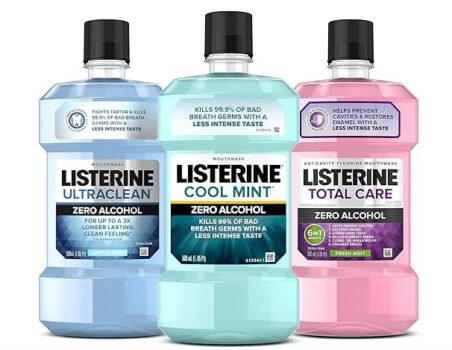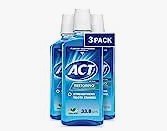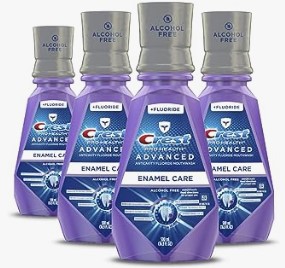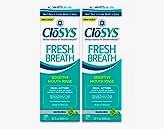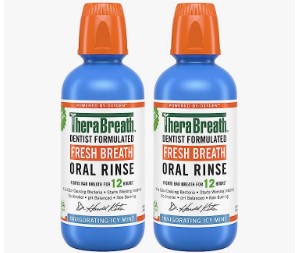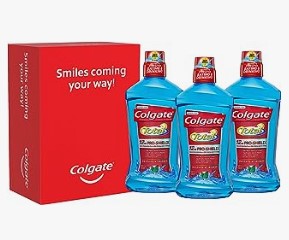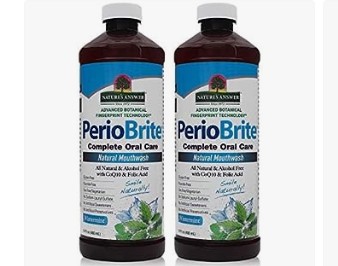The Ultimate Guide to Finding the Perfect Mouthwash: Your Complete Mouthrinse Buying Guide
Benefits of Mouthwash: Why Incorporating Mouthrinse into Your Oral Care Routine is Worth It
Using mouthwash as part of your daily oral care routine offers numerous benefits. Firstly, mouthwash helps to kill bacteria that can cause bad breath, leaving your breath fresh and clean. Additionally, it can help to prevent plaque buildup, reducing the risk of gum disease and tooth decay. Mouthwash also reaches areas that brushing and flossing may miss, ensuring a more thorough clean. Finally, certain types of mouthwash contain fluoride, which strengthens tooth enamel and helps to prevent cavities.
Listerine Mouthwash
Introduction
Mouthwash, also known as mouthrinse or oral rinse, offers numerous benefits that make it worth incorporating into your daily oral care routine. Apart from freshening your breath, mouthwash plays a crucial role in maintaining good oral hygiene. Regular use of mouthwash can help fight against plaque and gingivitis, reducing the risk of gum disease. Additionally, some types of mouthwash contain fluoride, which strengthens tooth enamel and helps prevent tooth decay. With its ability to reach areas that toothbrushes and floss may miss, mouthwash provides an extra layer of protection for your teeth and gums. So, why not take advantage of the many benefits mouthwash has to offer?
What is Mouthrinse (Mouthwash)
Mouthrinse, commonly known as mouthwash or oral rinse, is a liquid solution specifically formulated for oral hygiene purposes. It is typically used after brushing and flossing to enhance the cleanliness and freshness of the mouth. Mouthwash contains various active ingredients, such as antiseptics, fluoride, and antimicrobial agents, that help combat bacteria, reduce plaque buildup, and promote overall oral health. It is available in different flavors and types, including alcohol-based and alcohol-free options, catering to individual preferences and specific oral care needs. By incorporating mouthwash into your daily routine, you can enjoy the added benefits it provides for a healthier and more confident smile.
Key Points
Types of Mouthrinse
Mouthwash comes in different types, including therapeutic mouthwash, cosmetic mouthwash, and natural mouthwash. Each type offers unique benefits and is designed to target specific oral health concerns.
Benefits of Therapeutic Mouthwash
Therapeutic mouthwash contains active ingredients like chlorhexidine or hydrogen peroxide, which help kill bacteria, reduce gingivitis, and control plaque. It is often recommended by dentists for individuals with gum disease or those who have undergone dental procedures.
Benefits of Cosmetic Mouthwash
Cosmetic mouthwash focuses on freshening breath and providing a temporary minty sensation in the mouth. It may contain ingredients like essential oils or menthol, which mask bad breath but do not necessarily address underlying oral health issues.
Benefits of Natural Mouthwash
Natural mouthwash typically includes ingredients derived from plants or minerals, such as tea tree oil or baking soda. It offers a more gentle and chemical-free option for those seeking a natural approach to oral hygiene.
Additional Benefits of Mouthwash
In addition to freshening breath and reducing bacteria, mouthwash can also reach areas that may be difficult to clean with a toothbrush or floss alone. It can help reach the back of the mouth, between teeth, and along the gumline, providing a more comprehensive cleaning experience.
Conclusion
Incorporating mouthwash into your oral hygiene routine can provide added benefits for a healthier mouth, fresher breath, and improved overall oral health. Whether you choose a therapeutic, cosmetic, or natural mouthwash, using it regularly can help enhance your dental care routine and give you a confident smile.
Mouthwash Clinical Considerations
Mouthwash can be a valuable addition to a dental care routine, but it is important to use it correctly and consider any specific clinical considerations. Some mouthwashes may contain alcohol, which can cause dry mouth or irritation for some individuals. Additionally, certain mouthwashes may not be suitable for children or individuals with certain medical conditions. It is recommended to consult with a dentist or healthcare professional to determine the most appropriate mouthwash for your specific needs and to ensure proper usage.
Mouthwash Information for Patients
Using mouthwash as part of your oral care routine can have numerous benefits, including a healthier mouth, fresher breath, and improved overall oral health. Whether you opt for a therapeutic, cosmetic, or natural mouthwash, incorporating it into your daily routine can help improve your dental care and boost your confidence. However, it is crucial to use mouthwash correctly and consider any specific clinical considerations. Some mouthwashes contain alcohol, which may lead to dry mouth or irritation in certain individuals. Additionally, certain mouthwashes may not be suitable for children or those with specific medical conditions. To determine the most appropriate mouthwash for your needs and ensure proper usage, it is recommended to consult with a dentist or healthcare professional.
ADA Seal of Acceptance
The American Dental Association (ADA) Seal of Acceptance is a helpful tool for identifying mouthwash products that meet strict criteria for safety and effectiveness. This seal indicates that the product has undergone rigorous testing and meets the ADA’s standards for oral health benefits. When selecting a mouthwash, look for the ADA Seal of Acceptance to ensure that you are choosing a reliable and trustworthy product. Remember to always follow the instructions provided on the packaging and consult with a dental professional if you have any concerns or questions.
References
ADA Resources
To find more information about mouthwash and oral health, you can visit the ADA’s website at www.ada.org. They provide a range of resources such as articles, guides, and educational materials to help you make informed decisions about your oral care routine. Additionally, you can also consult dental professionals or healthcare providers for personalized recommendations and advice tailored to your specific needs.
What to Know About Choosing the Best Mouthwash
When choosing a mouthwash, it is important to consider your specific oral health needs. Different mouthwashes are designed to target various concerns, such as reducing plaque, freshening breath, or preventing gum disease. Therefore, it is recommended to consult with a dental professional to determine the most suitable mouthwash for you. They can assess your oral health and provide personalized recommendations that align with your specific needs and goals. Remember to always read the product labels and follow the instructions provided for optimal results.
How to Use Mouthwash
To use mouthwash effectively, start by pouring the recommended amount into a cup. Then, rinse your mouth vigorously for about 30 seconds, making sure to swish the liquid around all areas of your mouth, including your teeth, gums, and tongue. Spit out the mouthwash after the recommended time, being careful not to swallow it. For best results, avoid eating or drinking for at least 30 minutes after using mouthwash to allow the active ingredients to work effectively. It is recommended to use mouthwash after brushing and flossing your teeth, as part of your daily oral hygiene routine.
Review
Using mouthwash is a beneficial addition to your oral hygiene routine. It helps to freshen your breath, kill bacteria, and promote healthier gums. Remember to choose a mouthwash that is specifically formulated for your needs, such as fluoride mouthwash for cavity prevention or an alcohol-free option if you have sensitive gums. Incorporating mouthwash into your daily routine, along with regular brushing and flossing, can greatly improve your overall oral health.
Your Questions, Answered
Why do you need a rinse aid?
A rinse aid is used in dishwashers to improve the drying process and prevent water spots and streaks from forming on dishes and glassware. It helps to reduce surface tension on the dishes, allowing water to flow off more easily and promoting faster and more effective drying.
How to choose a rinse aid?
When choosing a rinse aid for your dishwasher, consider the following factors:
1. Compatibility: Ensure that the rinse aid is compatible with your dishwasher. Check the manufacturer’s guidelines or consult the user manual for recommended rinse aids.
2. Effectiveness: Look for rinse aids that have good reviews and are known for their effectiveness in reducing water spots, improving drying performance, and enhancing the overall cleanliness of your dishes.
3. Ingredients: Opt for rinse aids that are free from harsh chemicals and have environmentally friendly ingredients. Avoid products with phosphates, chlorine, or other harmful substances.
4. Brand reputation: Consider purchasing rinse aids from reputable brands that have a track record of producing high-quality products. Reading customer reviews and seeking recommendations can help you make an informed choice.
5. Price: Compare prices of different rinse aids and choose one that fits your budget. Keep in mind that higher-priced products may offer better performance or additional features, but it is not always necessary to opt for the most expensive option.
Remember to follow the instructions provided by the manufacturer for proper usage and dosage of the rinse aid.
To maintain good oral health, it is important to regularly visit a dentist. They can assess your oral health and provide personalized recommendations that align with your specific needs and goals. Remember to always read the product labels and follow the instructions provided for optimal results. When using mouthwash, start by pouring the recommended amount into a cup. Then, rinse your mouth vigorously for about 30 seconds, making sure to swish the liquid around all areas of your mouth, including your teeth, gums, and tongue. Spit out the mouthwash after the recommended time, being careful not to swallow it. For best results, avoid eating or drinking for at least 30 minutes after using mouthwash to allow the active ingredients to work effectively. It is recommended to use mouthwash after brushing and flossing your teeth, as part of your daily oral hygiene routine.
